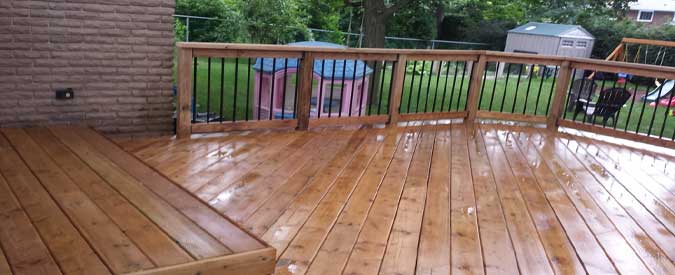Last Updated: April 11, 2023
Compare Wood vs Composite Deck Cost
Try Our Free Deck Cost Calculator
Fill out our 30 second free form to receive competitive pricing from pre-screened deck contractors. No commitments. Our service is always free!
Quick Summary: Composite vs Wood Deck Cost
On average, a pressure-treated wood deck will cost between $15 to $25 per square foot including installation. A cedar wood deck will cost $30 or more per square foot. A composite deck will cost $30 to $60 per square foot installed.
Below are some sample deck installation prices by location (updated: 2023):
| City | Zip Code | Average Price Paid |
|---|---|---|
| Boston, MA | 02108 | $9,947 |
| Charlotte, NC | 28105 | $6,489 |
| Newark, NJ | 08601 | $11,501 |
| New York City | 10001 | $8,959 |
| Philadelphia, PA | 19019 | $8,764 |
| Barnstable, MA | 02540 | $12,868 |
Wooden Decks
Wood is the original and most common choice for decking. It is durable, economical and lasts for decades if properly maintained.
The vast majority of decks are made with Southern yellow pine, a cheaper wood that is pressure treated to prevent weather damage, rotting and insect damage. Higher-quality woods such as cedar and redwood don’t require any type of pre-treatment because they contain natural preservatives.
How Much Does a Wood Deck Cost?
The price of a wood deck depends on the type of wood, the size and configuration of the deck and, to some degree, the difficulty of installation. Plan to spend around $15 to $25 per square foot for pressure-treated wood such as Southern yellow pine and around $25 to $30 per square foot for high-end wood such as cedar and redwood. Both prices include the cost of materials and installation. On the low end of those price ranges, you’ll get a basic deck without benches or a railing.
Let’s say you’re planning to build 16x20-foot deck. Based on the price ranges above, the total cost works out to $4,800 to $8,000 for pressure-treated pine and $8,000 to $9,600 for cedar or redwood.
Wood Decks Pros
- Look - A wood deck appears authentic because it is authentic. It looks, feels and smells like real wood. Most people consider a wood deck more attractive than composite.
- Price - Wood decking generally costs less than composite. Pressure-treated pine sells for about half the price, while premium woods like cedar and redwood cost slightly less than composite.
- Lifespan - Decks constructed using high-quality wood can last 40 years or more with regular maintenance. Although many manufacturers claim composite can last that long or longer, the product hasn’t been around long enough to know for sure.

Try Our Free Deck Cost Calculator
Fill out our 30 second free form to receive competitive pricing from pre-screened deck contractors. No commitments. Our service is always free!
Wood Decks Cons
- Maintenance - Most decks need to be sanded, thoroughly cleaned and stained or sealed about every two to five years (depending on the type of stain and weather conditions). Left untreated, wood decking will fade and eventually rot.
- Wear and tear - There’s always the possibility that your deck will splinter or warp, particularly in harsh climates. Pressure-treated woods are particularly susceptible to warping.
Video: Composite vs Wood Decking
Here is a video on the differences between wood and composite decking.
Composite Decks
Composite is a manmade decking product that has gained popularity over the last decade. It is manufactured using a combination of wood fiber and plastic. The planks are designed to look like wood, although most people can tell the difference between natural wood and composite. Even with a composite deck, the load-bearing supports are made of natural wood because it is sturdier.
How Much Does a Composite Deck Cost?
Composite decks generally cost about $30 to $60 per square foot installed. For a 16x20-foot deck, that works out to $9,600 to $19,200. Budget on the high end of that price range if you’re adding features like railings or benches to the deck.
People often wonder why composite decks are more expensive than natural wood decks. The answer? They’re more expensive to manufacturer. The trade off is that maintenance costs are far lower and composite decks are expected to last longer.
- Maintenance - Composite requires far less maintenance. It never needs sanding, sealing or staining. However, it does need to be cleaned several times a year to remain in good condition.
- Durability - Composite is stain-resistant and holds up to harsh weather. It will not splinter or rot.
- UV resistance - Composite decks will not fade or lighten over time like natural wood. They retain the original color for many years.
Composite Cons
- Not real wood - Some composite decking looks cheap and not at all like real wood (other composite looks great, though - brand matters). The artificial surface can also be slippery.
- Quality concerns - Composite is a relatively new product, so questions have been raised about its long-term durability. These questions won’t be fully answered until the product has been available for decades.
- Can’t be refinished - You can’t refinish or repair a composite deck when it starts to show signs of wear and tear. The only option is to replace it.
Resources:
- 7 Reasons to Choose a Composite Deck Over Wood
- Trex Composite Decking vs. Real Wood Decking: Which Is the Better Choice?
Find the Best Deck Pros Who Will Compete for Your Business
Try Our Free Deck Cost Calculator
Fill out our 30 second free form to receive competitive pricing from pre-screened deck contractors. No commitments. Our service is always free!
Try Our Free Deck Cost Calculator
Fill out our 30 second free form to receive competitive pricing from pre-screened deck contractors. No commitments. Our service is always free!